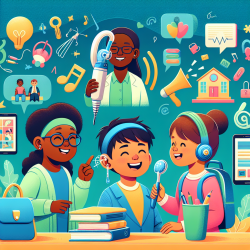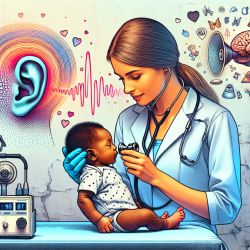Understanding Autism in 3q29 Deletion Syndrome: Key Insights for Practitioners
As a speech-language pathologist, staying informed about the latest research is crucial to providing the best care for children with diverse needs. One such area of interest is the intersection of autism spectrum disorder (ASD) and genetic conditions like the 3q29 deletion syndrome. A recent study titled "Autism spectrum disorder symptom expression in individuals with 3q29 deletion syndrome" sheds light on this topic, offering insights that can enhance our understanding and approach to therapy.
Key Findings from the Study
The study evaluated 31 individuals with 3q29 deletion syndrome using gold-standard ASD evaluations: the Autism Diagnostic Observation Schedule, Second Edition (ADOS-2), and the Autism Diagnostic Interview, Revised (ADI-R). The findings revealed that:
- Individuals with 3q29 deletion syndrome exhibit significant social disability, irrespective of an ASD diagnosis.
- Those with both 3q29 deletion and ASD (3q29del+ASD) show similar levels of social disability to non-syndromic ASD (nsASD) individuals.
- Social communication skills are relatively preserved in 3q29del+ASD compared to nsASD, particularly in nonverbal communication.
- Speech delay in 3q29del+ASD is not associated with improved nonverbal communication, indicating that these skills develop independently.
Implications for Practitioners
These findings have several implications for practitioners working with children who have 3q29 deletion syndrome:
- Early Evaluation: It's crucial to conduct early, gold-standard ASD evaluations for children with 3q29 deletion syndrome to identify social disabilities and tailor interventions accordingly.
- Focus on Social Skills: Even in the absence of an ASD diagnosis, children with 3q29 deletion may benefit from social skills interventions. Practitioners should advocate for these services to improve social functioning.
- Nonverbal Communication: Given the preserved nonverbal communication abilities, therapy can leverage these strengths to enhance overall communication skills.
Encouraging Further Research
The study highlights the need for further research to explore the nuances of social disability in 3q29 deletion syndrome. Practitioners are encouraged to stay updated on emerging research and consider participating in studies to contribute to the growing body of knowledge.
For a deeper dive into the study, practitioners can access the original research paper here.
By integrating these insights into practice, speech-language pathologists can enhance their approach to therapy, ultimately leading to better outcomes for children with 3q29 deletion syndrome and similar conditions.










